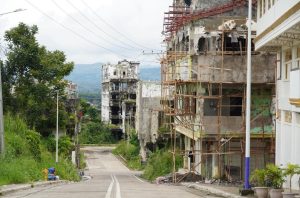 The ruins at the Ground Zero of the Marawi are being restored seven years after the siege in 2017. (Marhom Ibrahim/BIO)
The ruins at the Ground Zero of the Marawi are being restored seven years after the siege in 2017. (Marhom Ibrahim/BIO)
The battle for Marawi ended over seven years ago, but for the thousands of displaced families, the fight for normalcy continues. As the national government pushes forward with the physical rehabilitation of the city, the Bangsamoro Government’s Marawi Rehabilitation Program (MRP) has emerged as one of its partners in the effort to provide concrete solutions to the many challenges that remain.
“The MRP was developed in October 2020 out of necessity,” said Engr. Abdulhanif A. Ondi, Supervising Head of MRP. “We needed to ensure that Marawi’s recovery was not just about rebuilding structures but about restoring lives and communities.”
In just a few short years, the MRP has made significant progress in its implementation.
“Based on our database, we have a total of 58,767 validated beneficiaries. Of which, 32,762 have received assistance since MRP’s inception,” Engr. Ondi shares.
“Nearly 60% of those we have helped are now on their way to regaining stability,” he adds. As of writing, the MRP’s Project Management Office implements a total of 56 projects and majority of which focuses on health, education, and infrastructure.
Among its many accomplishments is the Community Material Assistance (CMA) Program, which has provided 500 displaced families with P200,000 worth of construction materials needed to build each of their homes. Of these, 29 have completed construction, and 75 others are expected to finish within the year. MRP is also about to release their labor cost subsidy worth P60,000 each to the IDPs who finished the reconstruction of their houses.
MRP also partnered with the Ministry of Human Settlements and Development and local government units of Kapai and Saguiaran for the construction of a total of 625 approved permanent shelters for the IDPs. All of which are under regular and strict monitoring of MRP to ensure its timely completion.
In terms of education, the program has delivered school equipment and supplies to educational institutions, including madrasahs, torils, and technical-vocational schools. It has also supported the private educational institutions previously located in the Most Affected Area (MAA) through the provision of Tuition Fee Subsidy to their new enrollees. 3,000 qualified students are also set to receive educational cash subsidies before 2024 ends.
“We had to ensure that education of the internally displaced students did not come to a halt because it is their basic right,” Ondi added.
Health services have also been a top priority for the MRP. Through ongoing medical missions and partnerships with local hospitals, MRP has been able to provide free consultations and medicines to the internally displaced persons (IDPs) residing in both permanent and temporary shelters. Their ongoing on-site free general and dental consultations which started on July 29, 2024 has served 934 patients. MRP also recently signed memoranda of agreements (MOAs) with four hospitals in Marawi City to cover up to ₱10,000 for in-patient care and ₱5,000 for out-patient treatment, excluding those who sought assistance from the Ayudang Medikal mula sa Bangsamoro Government (AMBaG) Program.
Apart from these major programs, MRP has been implementing water rationing initiatives for IDPs in shelters, have provided 2,000 beneficiaries with P15,000 in business capital, and is set to construct five (5) multipurpose halls in the shelters. A total of 300 qualified households will also be provided with solar-hybrid energy systems in the coming months.
Like any large-scale rehabilitation effort, MRP has faced its share of challenges. Engr. Ondi shared that the program has taken lessons from previous initiatives and is constantly evolving to better meet the needs of IDPs.
“For 2025, we are still in the process of identifying additional assistance needed by the Marawi IDPs, which are also subject to approval of the Project Steering Committee,” he shares.
Engr. Ondi reassured the IDPs still waiting to return to their homes that they can trust the ongoing efforts to support them. He emphasized that all necessary agreements have been signed and the disbursement of funds is in progress.
Ondi also reflected on the long road ahead for Marawi’s complete rehabilitation.
While much has been accomplished, the work of rebuilding Marawi is far from over. The MAA remains a long way from resembling the bustling city it once was.
“Rehabilitation is more than just physical structures. We will know we’ve succeeded when families can return to their homes, reclaim their lives, and no longer carry the label of ‘IDP’. Until then, we continue our work,” Engr. Ondi remarks. (Norjana Malawi/BIO)







